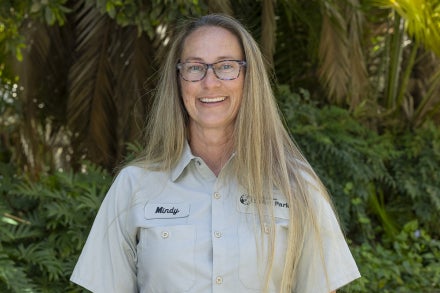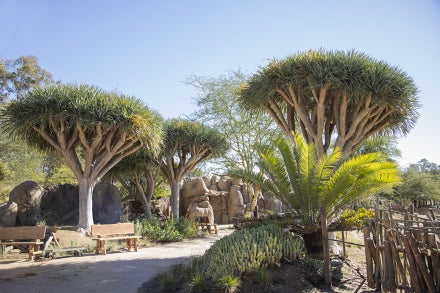
New Show Focuses on Life in the Zoo’s Endangered African Penguin Colony
Following the success of Animal Planet’s “The Zoo: San Diego,” San Diego Zoo Global is entering new territory with the release of its first-ever “reality television-style” web series: “Penguin Beach.” This original episodic show is set to premiere Thursday, October 10, 2019—just two days before African Penguin Awareness Day—on Facebook, Instagram TV, and YouTube. The show will focus on the dramatic, hilarious and often unexpected social dynamics of the San Diego Zoo’s colony of endangered African penguins.
“This is still a new colony, so It’s been amazing to watch the penguins’ personalities unfold over the past two years,” said Lara Jones, a keeper at the San Diego Zoo’s Dan and Vi McKinney Penguin Habitat in Conrad Prebys Africa Rocks. “They are definitely a wild bunch, so the viewers can expect a wide range of behaviors that will make you laugh, cry and possibly fall in love with each of the characters.”
The opening episode of “Penguin Beach” follows Jack, the newest resident of the colony, as he tries to figure out his role while avoiding conflicts with his adult penguin neighbors. Throughout the series, viewers will learn about the many facets of life at Penguin Beach, including the penguins’ individual personalities and how they handle disagreements with their mates and their neighbors. San Diego Zoo animal care staff will provide insightful and entertaining commentary, addressing “drama” in the colony and offering expert information about these birds’ natural behaviors.
The Zoo’s penguin colony is a part of the San Diego Zoo Global’s overall penguin conservation initiative. The organization participates in the Association of Zoos and Aquariums’ Species Survival Plan (SSP) program for these aquatic birds and partners with the Southern African Foundation for the Conservation of Coastal Birds (SANCCOB), to help facilitate conservation programs in South Africa.
The African penguin is listed as Endangered on the International Union for Conservation of Nature (IUCN) Red List of Threatened Species. Once one of southern Africa’s most abundant seabirds, the species has suffered a massive population decline—from an estimated 1 million breeding pairs to only 23,000 breeding pairs today, a population decrease of more than 60 percent in the past 28 years. Historically, penguin eggs and guano were commercially harvested, which had a devastating effect on the population. Although both practices were abolished toward the end of the 20th century, other threats—including a lack of readily available food due to overfishing, climate change, oil and marine pollution, the emergence of avian influenza A (H5N8) virus and habitat degradation—contribute to a continuing population decline.
Zoo guests can visit Jack and the rest of the “stars” of “Penguin Beach” at their home in the Dan and Vi McKinney Penguin Habitat inside Conrad Prebys Africa Rocks. Their habitat features a rocky beach, penguin nesting areas and rockwork that mimics the granite boulders found at Boulders Beach in South Africa. There’s also a 200,000-gallon saltwater pool for the penguins that stretches 170 feet, with depths up to 13 feet.
The San Diego Zoo is globally recognized and a San Diego icon, hosting close to 4 million guests each year. At the San Diego Zoo, visitors can watch penguins and sharks swim, observe the behavior of century-old Galápagos tortoises, enjoy the beauty of exotic orchids, marvel at the koalas, explore walkthrough aviaries filled with the songs and colors of rare birds, and appreciate the power of leopards and jaguars. The San Diego Zoo is also accredited by the American Association of Museums as a Botanical Garden. As visitors discover the rare and endangered species at the San Diego Zoo, they are directly contributing, through admission and on-grounds sales, to the efforts of San Diego Zoo Global, an international nonprofit conservation organization that works to fight extinction through recovery efforts for plants and animals worldwide. To learn more, visit sandiegozoo.org, or connect with us on Facebook, Twitter,Instagram or YouTube.




